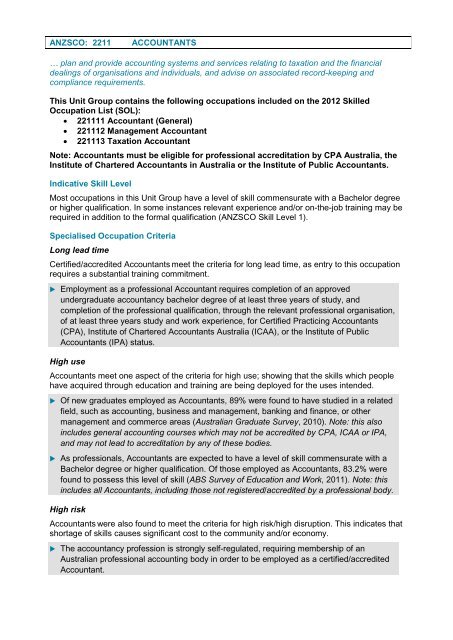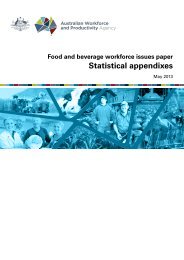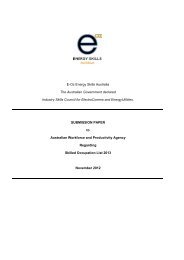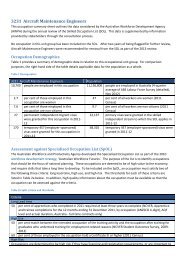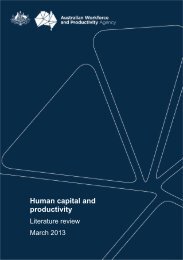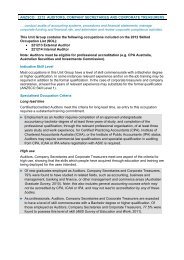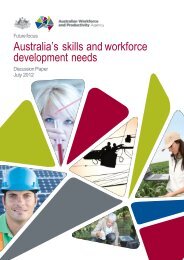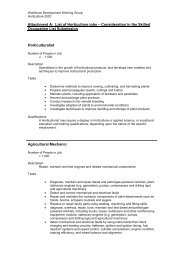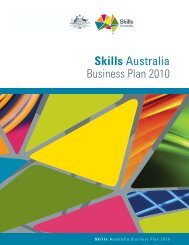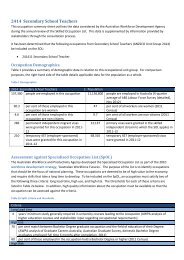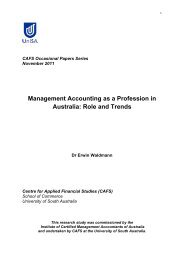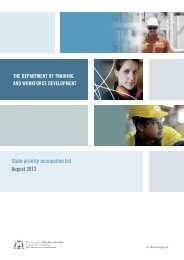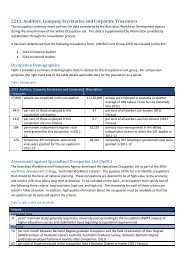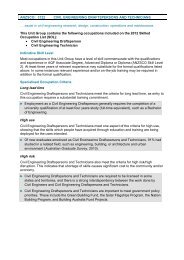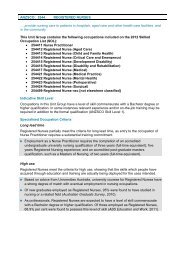ANZSCO: 2414 - AWPA
ANZSCO: 2414 - AWPA
ANZSCO: 2414 - AWPA
Create successful ePaper yourself
Turn your PDF publications into a flip-book with our unique Google optimized e-Paper software.
<strong>ANZSCO</strong>: 2211<br />
ACCOUNTANTS<br />
… plan and provide accounting systems and services relating to taxation and the financial<br />
dealings of organisations and individuals, and advise on associated record-keeping and<br />
compliance requirements.<br />
This Unit Group contains the following occupations included on the 2012 Skilled<br />
Occupation List (SOL):<br />
221111 Accountant (General)<br />
221112 Management Accountant<br />
221113 Taxation Accountant<br />
Note: Accountants must be eligible for professional accreditation by CPA Australia, the<br />
Institute of Chartered Accountants in Australia or the Institute of Public Accountants.<br />
Indicative Skill Level<br />
Most occupations in this Unit Group have a level of skill commensurate with a Bachelor degree<br />
or higher qualification. In some instances relevant experience and/or on-the-job training may be<br />
required in addition to the formal qualification (<strong>ANZSCO</strong> Skill Level 1).<br />
Specialised Occupation Criteria<br />
Long lead time<br />
Certified/accredited Accountants meet the criteria for long lead time, as entry to this occupation<br />
requires a substantial training commitment.<br />
Employment as a professional Accountant requires completion of an approved<br />
undergraduate accountancy bachelor degree of at least three years of study, and<br />
completion of the professional qualification, through the relevant professional organisation,<br />
of at least three years study and work experience, for Certified Practicing Accountants<br />
(CPA), Institute of Chartered Accountants Australia (ICAA), or the Institute of Public<br />
Accountants (IPA) status.<br />
High use<br />
Accountants meet one aspect of the criteria for high use; showing that the skills which people<br />
have acquired through education and training are being deployed for the uses intended.<br />
Of new graduates employed as Accountants, 89% were found to have studied in a related<br />
field, such as accounting, business and management, banking and finance, or other<br />
management and commerce areas (Australian Graduate Survey, 2010). Note: this also<br />
includes general accounting courses which may not be accredited by CPA, ICAA or IPA,<br />
and may not lead to accreditation by any of these bodies.<br />
As professionals, Accountants are expected to have a level of skill commensurate with a<br />
Bachelor degree or higher qualification. Of those employed as Accountants, 83.2% were<br />
found to possess this level of skill (ABS Survey of Education and Work, 2011). Note: this<br />
includes all Accountants, including those not registered/accredited by a professional body.<br />
High risk<br />
Accountants were also found to meet the criteria for high risk/high disruption. This indicates that<br />
shortage of skills causes significant cost to the community and/or economy.<br />
The accountancy profession is strongly self-regulated, requiring membership of an<br />
Australian professional accounting body in order to be employed as a certified/accredited<br />
Accountant.
SOL Summary<br />
The number employed in this Unit Group is expected to grow by 9.3% to 2015-16, while<br />
domestic commencements in accounting specialisations have decreased by 8.3% over the past<br />
five years, signalling a downturn in domestic supply.<br />
Unemployment rates for Accountants continue to remain below the ‘all occupations’ average.<br />
Each of the professional Accounting bodies provided submissions highlighting a number of<br />
issues which support the view that migration will continue to be required to supplement<br />
domestic supply in this occupation over the medium term.<br />
The evidence indicates that the demand for Accountant (General), Management Accountant<br />
and Taxation Accountant is expected to exceed supply over the medium to longer term.<br />
Accountant (General), Management Accountant and Taxation Accountant are included on the<br />
2012 SOL but continue to be flagged for further monitoring of labour market conditions to<br />
ensure the economy maintains its strong capacity to absorb the high level of independent<br />
migrants in this occupation.
Occupation trends<br />
<strong>ANZSCO</strong>: 2211<br />
Accountants<br />
Employment level<br />
6 digit employment<br />
(2006 Census)<br />
Employment growth<br />
Unemployment rate<br />
Educational profile<br />
Vacancies<br />
Gender<br />
Labour turnover<br />
Age profile<br />
158 100 A high proportion of workers (83.5%) are employed full-time.<br />
2211-11 Accountant (General) 112 790<br />
2211-12 Management Accountant 2910<br />
2211-13 Taxation Accountant 7510<br />
Over the five years to November 2011, employment in this occupation<br />
increased by 6.9% (compared with growth of 10.4% for all occupations).<br />
Employment over the next five years is expected to increase by 9.3%.<br />
2.0% compared with 3.1% for all occupations.<br />
83.2% have a Bachelor degree or higher qualification.<br />
The Internet Vacancy Index (IVI) fell by 4.7% over the 12 months to<br />
November 2011. Vacancies for all occupations fell by 7.1%.<br />
49.0% of workers in this occupation are female (compared with 45.5% for all<br />
occupations).<br />
Annually, 10.3% of Accountants, Auditors and Company Secretaries (which<br />
includes Accountants) leave their occupation group, creating some potential<br />
job openings (this compares with 14.2% across all occupations).<br />
The median age is 37 years and 30.5% of workers are aged 45 years and<br />
over (compared with 38.5% for all occupations).<br />
Earnings Median full-time weekly earnings (before tax) are $1265 compared with $1050<br />
for all occupations.<br />
Graduate outcomes<br />
Data from Graduate Careers Australia (GCA) indicate that 78.6% of students<br />
completing a Bachelor degree in the field of accounting in 2010 (and who<br />
were available for full-time work) were in full-time employment four months<br />
after graduating. This is slightly above the average for all Bachelor degree<br />
graduates (76.6%).<br />
GCA data indicate that labour market outcomes for these 2010 accounting<br />
graduates are weaker than those recorded for 2008 graduates (more than<br />
85% of whom secured full-time employment four months after graduating).<br />
Outcomes for Masters (by coursework) graduates are particularly weak, with<br />
69.2% of those available for full-time employment working full-time four<br />
months after graduation (compares with 84.6% of all Masters coursework<br />
graduates).<br />
Skill shortages Shortages of Accountants were relatively persistent until 2008.<br />
Labour market<br />
Shortages of Accountants were persistent until the onset of the global recession when demand fell markedly.<br />
There has not been a significant pick-up in demand since then and the labour market remains subdued.<br />
Recruitment experiences in 2011 suggest the labour market has eased further over the past year and that<br />
there is some surplus supply of qualified Accountants. There is no evidence of shortages re-emerging.<br />
Almost 90% of surveyed vacancies in late 2011 were filled and there were large fields of candidates (an<br />
average of 28 per vacancy), with 4.5 suitable applicants per vacancy overall, significantly above the number<br />
of suitable applicants per vacancy across all surveyed occupations of 1.7.<br />
Metropolitan employers were more successful than regional employers; filling 96% of surveyed vacancies<br />
and attracting an average of 31 applicants per vacancy, with five per vacancy considered to be suitable.<br />
Significant numbers of those applicants considered to be unsuitable held relevant qualifications (some at the<br />
Department of Education, Employment and Workplace Relations (DEEWR) January 2012
post-graduate level) but were unsuitable for other reasons, including low levels of written and oral<br />
communication skills.<br />
Regional employers filled 76% of vacancies; receiving an average of 21 applicants, of whom three were<br />
suitable.<br />
Management Accountant, Taxation Accountant and Accountant (General) were not disaggregated prior to<br />
2009 (they were a single six digit occupation under the title Accountant). It is therefore difficult to provide a<br />
historical perspective of these separate accounting streams.<br />
2211-11 Accountant (General)<br />
DEEWR research in late 2011 shows employers filled vacancies for General Accountants with ease. About<br />
85% of general accountant vacancies were filled, with unfilled vacancies primarily being for senior positions,<br />
although a small number remained unfilled because the preferred candidate withdrew. Vacancies attracted<br />
an average of 28 applicants, five of whom were considered by employers to be suitable.<br />
In 2011, the average number of applicants and suitable applicants rose markedly compared with 2010,<br />
suggesting some excess supply of these professionals and strong competition for vacancies among qualified<br />
accountants.<br />
2211-12 Management Accountant<br />
There are no shortages of Management Accountants. Employers contacted by DEEWR in 2011, who had<br />
advertised for Management Accountants, filled all advertised vacancies across sectors and experience levels<br />
in both metropolitan and regional areas. Advertised positions attracted an average of 25 applicants per<br />
vacancy, with five per vacancy considered by employers to be suitable.<br />
2211-13 Taxation Accountant<br />
DEEWR research shows employers recruiting Taxation Accountants attracted slightly fewer suitable<br />
applicants per vacancy than those recruiting for the other two Accountant occupations in this unit group,<br />
although there is no evidence of shortages and they had relatively large fields of qualified applicants from<br />
whom to chose. About 85% of taxation accountant vacancies were filled. Employers received an average of<br />
21 applications per vacancy with three candidates per position considered to be suitable.<br />
Department of Education, Employment and Workplace Relations (DEEWR) January 2012
Department of Education, Employment and Workplace Relations (DEEWR) January 2012


